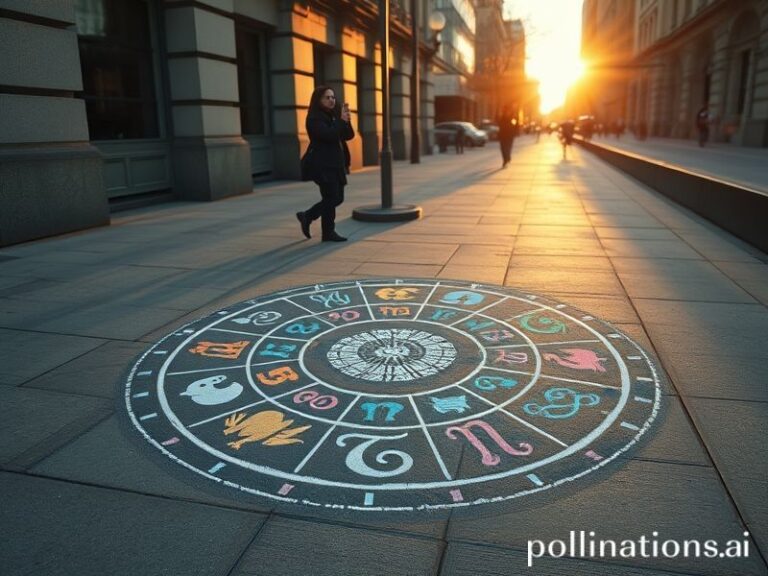Marlee Matlin: The Deaf Oscar Winner Who Makes the World Unmute Itself
Marlee Matlin and the Quiet Art of Shouting Louder Than Bombs
By Dave’s Locker Foreign Desk
When Marlee Matlin flicked her fingers at the 93rd Academy Awards, half the planet thought she was giving the camera a sly middle-finger salute. In reality she was signing “thank you” in American Sign Language—proof, once again, that misinterpretation is humanity’s favorite indoor sport. The moment lasted three seconds, traveled at light speed across TikTok, and landed harder in Lagos cafés than most State Department press releases.
Why should a 57-year-old actress from Morton Grove, Illinois, still rattle the global china cabinet? Because in a world that has mastered the art of selective deafness—Uyghur internment camps, melting glaciers, crypto-bros who believe JPEGs are retirement plans—Matlin has spent four decades refusing to let anyone switch the subtitles off.
Let’s zoom out. One percent of the global population, roughly 80 million people, use sign language as a primary mode of communication. That’s the entire population of Germany, plus everyone still pretending to enjoy Oktoberfest. Yet subtitles, the polite fiction that we’re all reading along, are still treated like a benevolent afterthought, the cinematic equivalent of parsley. Matlin’s Oscar in 1987 for *Children of a Lesser God* was supposed to change that. Instead, we got three decades of inspirational montages and exactly one Marvel character whose superpower is apparently “wears a hearing aid.” Progress, like a budget airline sandwich, is smaller than advertised.
Internationally, Matlin has become a Rorschach test for how societies treat their inconvenient citizens. In Japan, where disability is politely hidden like an embarrassing tattoo, her cameo in *CODA* sparked a public debate about “barrier-free cinema” that ended, predictably, with the construction of exactly one ramp in Shibuya—now Instagram-famous as the place to pose with bubble tea and performative empathy. Meanwhile, in Brazil, evangelical broadcasters mistranslated her sign-language acceptance speech to claim she was “praising Jesus,” a theological leap roughly equivalent to turning a parking ticket into papal infallibility.
Hollywood, never missing an opportunity to monetize morality, has responded with the enthusiasm of a hungover sommelier. Streaming giants now trumpet “inclusive storytelling” while quietly burying Deaf-led projects in algorithmic catacombs somewhere between *Ancient Aliens* Season 47 and a documentary on competitive yodeling. Matlin, ever the diplomat, calls this “evolution.” The rest of us might call it a protection racket performed in Dolby Atmos.
Still, the ripple effects are real. In Nigeria, Nollywood producers—never a crowd to miss a revenue stream—have begun courting Deaf actors, discovering that sign-language melodrama plays spectacularly well in noisy Lagos traffic where every film is already experienced as a silent movie. The EU, never shy about legislating the curvature of bananas, now mandates that 30% of all public broadcaster content be accessible by 2025; bureaucrats in Brussels are currently locked in a semantic death match over whether sarcasm counts as accessibility.
Matlin herself seems bemused by the circus. When asked at Cannes what she thought of AI-generated sign-language avatars, she deadpanned, “I’ve seen robots with better emotional range than half the actors here.” The audience, unsure whether to laugh or update their résumés, did both.
And so the woman once told by a studio executive that she would “never work again because nobody wants to read a movie” has outlasted three parent companies, two streaming wars, and one global pandemic whose primary linguistic contribution was the phrase “you’re on mute.” Her real legacy isn’t the trophies gathering dust on a shelf; it’s the creeping realization that communication is a contact sport, and the privileged have been faking injuries for years.
In the end, Matlin’s greatest trick isn’t that she made the world listen—it’s that she made it confess how hard it tried not to. And that, dear reader, is the sort of twist even M. Night Shyamalan would kill for, if only he could find a plot hole big enough to bury the body.







